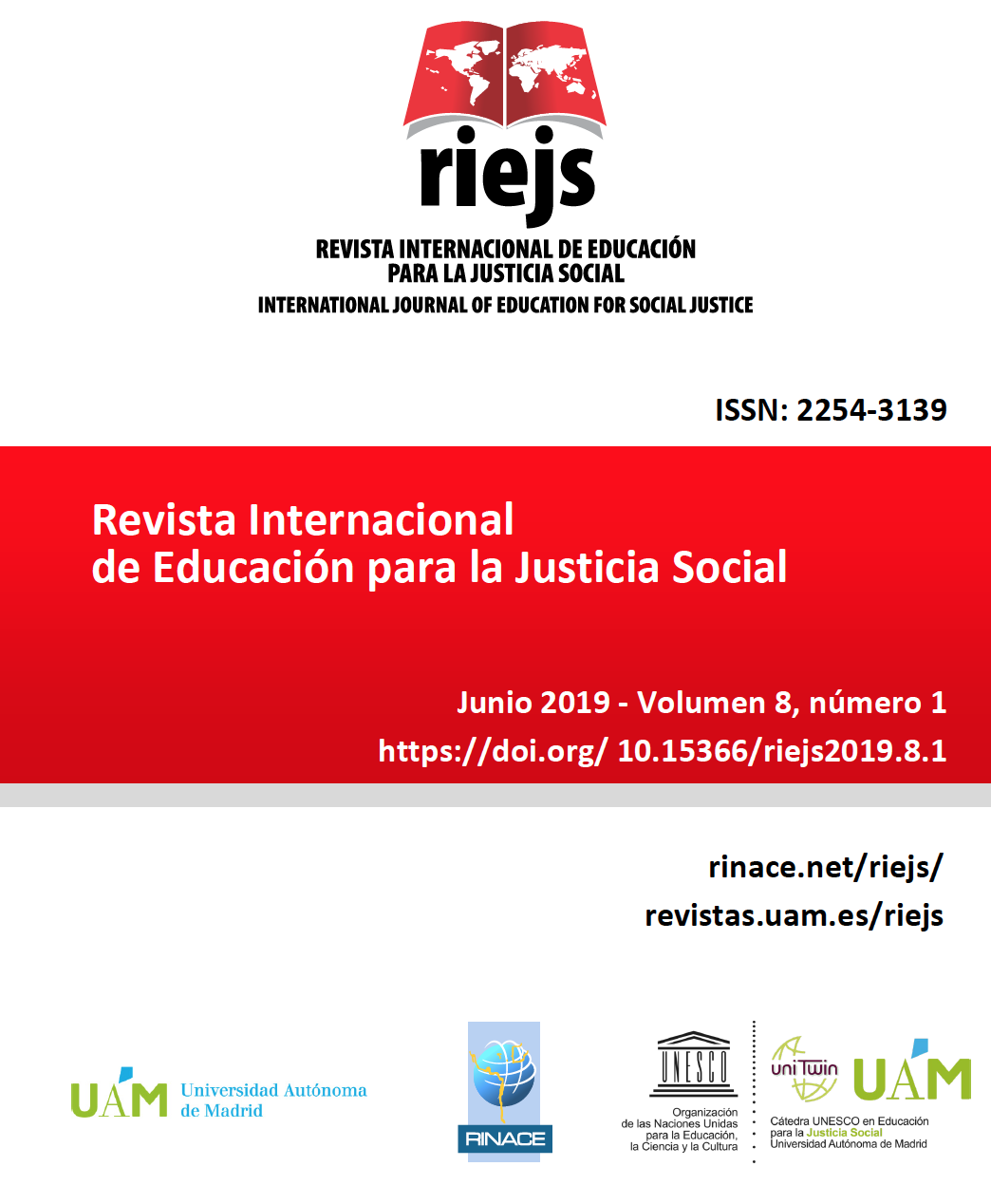Keywords:
Peace education, Evaluation, Violence, Conflict research, School community relationship.Copyright (c) 2019 Internacional Journal of Education for Social Justice

This work is licensed under a Creative Commons Attribution-NonCommercial-NoDerivatives 4.0 International License.
Abstract
SDG16 aims at fostering peaceful and inclusive societies and accountable and inclusive institutions. (How) can this be achieved through peace education? The article evaluates the extent in which 25 European peace education practices succeed contributing to the accomplishment of sdg16 regarding the decrease of violence and the improvement of democratic institutions. Taking into account peacebuilding literature that highlights the importance of institutionalizing peace education initiatives, the article analyses the objectives, target, approaches, results and impacts of the 25 initiatives, and assesses to what extent they address the micro, meso, and macro level. Results show that a relatively high proportion of objectives (23,9%) focus on the institutional-school level, that most of them target multipliers (as teachers and school staff) and that many practices prioritise a preventive approach. Regarding results and impacts, outstanding results are reached in skills development for conflict transformation, but that this does not imply significant reductions of violent situations. While most of the practices aim at more comprehensive results than violence contention –but rather a broader conception of peaceful coexistence– very few take action to foster the participation of students in the school system. Further research is needed to identify indicators of structural and cultural violence at schools, to assess the effectiveness of mainstreaming peace and conflict education principles in the school institution to decrease violence, and about the educational policies that better contribute to effective peace and conflict education programs.
Downloads
References
Barbeito, C., & Ospina, J. (2015). Assessing peace education at the national level: Challenges and possibilities. In C. Del Felice, A. Karako, & A. Wisler (Eds.), Peace education evaluation. Learning from experience and exploring prospects (pp. 239-253). Charlotte, CA: Information Age Publishing.
CDA. (2016). Refecting on peace practices basics a resource manual. Cambridge, MA: CDA.
Cremin, H., & Bevington, T. (2017). Positive peace in schools. Tackling conflict and creating a culture of peace in the classroom. New York, NY: Routledge. https://doi.org/10.4324/9781315304236
Council of Europe. (2015). Living with controversy: Teaching controversial issues through education for democratic citizenship and human rights. Strasbourg: Council of Europe.
Davies, L. (2004). Education & conflict: Complexity and chaos. London: Routledge Falmer. https://doi.org/10.4324/9780203711804
Harris, I. (April, 2003). Peace education evaluation. Paper presented at the American Educational Research Association. Chicago, IL.
Kupermintz, H., & Salomon, G. (2005). Lessons to be learned from research on peace education in the case of intractable conflict. Theory into Practice, 44(4) 293-302. https://doi.org/10.1207/s15430421tip4404_3
Nevo, B., & Brem, I. (2002). Peace education programs and the evaluation of their effectiveness. In G. Salomon, & B. Nevo (Eds.), Peace education: The concepts, principles and practices around the world (pp. 271-283). Mahwah, NJ: Lawrence Earlbaum.
Paffenholz, T. (2010). Civil society and peacebuilding. A critical assessment. Boulder, CO: Lynne Rienner Publishers Inc.
Spruyt, B., Elchardus, M., Roggemans, L. & Van Droogenbroeck, F. (2014). Can peace be taught? Researching the effectiveness of peace education. Brussels: Flemish Peace Institute.
UNICEF. (2017). A familiar face. Violence in the lives of familiar and adolescents. New York, NY: UNICEF.
UNICEF. (2018). An everyday lesson: #ENDviolence in Schools. New York, NY: UNICEF.
Wintersteiner, W. (2015). Towards a more complex evaluation of peace education. In C. Del Felice, A. Karako, & A. Wisler (Eds.), Peace education evaluation. Learning from experience and exploring prospects (pp. 19-37). Charlotte, CN: Information Age Publishing.

